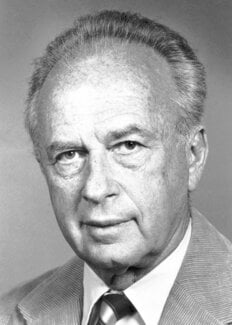Yitzhak Rabin
Biographical

Yitzhak Rabin was born in Jerusalem in 1922; he studied at the Kadoorie Agricultural College where he graduated with distinction.
His military career began in 1940 when he joined the “Palmach”, the elite unit of the Haganah. During the War of Independence (1948-1949), he commanded the Harel Brigade, deployed on the Jerusalem front. For the next 20 years, he served with the IDF as O.C. Northern Command (1956-1959); as Chief of Operations and Deputy Chief of Staff (1959-1964) and as Chief of Staff (1964-1968), commanding the IDF during the Six-Day War.
On January 1, 1968, he retired from military service and shortly afterwards was appointed ambassador to the United States. During his years as ambassador in Washington, he promoted and consolidated the ties between the two countries.
In the spring of 1973, Rabin returned to Israel and became active in the Labour Party. He was elected Member of the Knesset in December 1973 and when Golda Meir formed her government in April 1974, was appointed Minister of Labour.
On June 2, 1974, the Knesset expressed confidence in a new government headed by Prime Minister Yitzhak Rabin.
During Rabin’s premiership, the government placed special emphasis on strengthening the economy, solving social problems and reinforcing the IDF.
With American mediation, disengagement agreements were signed with Egypt and Syria (1974), followed by an interim agreement with Egypt in 1975. Later in 1975, the first Memorandum of Understanding was signed between the governments of Israel and the United States.
In June 1976, Rabin’s government issued the order for “Operation Entebbe”, liberating the hijacked Air France passengers.
Following the May 1977 elections, and until the formation of the National Unity Government in September 1984, Rabin served as a Knesset Member of the Labour Party in opposition and was a member of the Foreign Affairs and Defense Committee.
In the National Unity Governments (1984-1990), Rabin served as Minister of Defense. In January 1985, he presented the proposal for the withdrawal of IDF forces from Lebanon and the establishment of a security zone to guarantee peace to the settlements along Israel’s northern border.
Yitzhak Rabin was elected chairman of the Israel Labour Party in its first nationwide primaries conducted in February 1992 and led the party to victory in the June 1992 Knesset elections.
In July 1992, Rabin formed Israel’s 25th government and became its 11th Prime Minister and Minister of Defense, and acting Minister of Religious Affairs and Labour and Social Affairs.
Rabin’s biographical book, “Service Notebook“, was published in 1979 and was translated into English and French.
His book on Lebanon, written after Operation “Peace for Galilee”, was published in 1983.
This autobiography/biography was written at the time of the award and later published in the book series Les Prix Nobel/ Nobel Lectures/The Nobel Prizes. The information is sometimes updated with an addendum submitted by the Laureate.
|
Selected Bibliography |
| General |
| Corbin, Jane. The Norway Channel. New York: Atlantic Monthly, 1994. By BBC reporter with good access to the negotiators. |
| Freedman, Robert Owen, ed. Israel under Rabin. Boulder: Westview, 1995. |
| Laqueur, Walter, and Barry Rubin, eds. The Israel-Arab Reader. A Documentary History of the Middle East Conflict. 5th rev. ed., PB, New York: Penguin, 1995. |
| Makovsky, David. Making Peace with the P.L.O.: The Rabin Government’s Road to the Oslo Accord. Boulder: Westview, 1996. By a diplomatic correspondent with critical perspective. Includes many documents. |
| Peleg, Ilan, ed. Middle East Peace Process: Interdisciplinary Perspectives. Albany, NY: State University of N.Y. Press, 1998. |
| Perry, Mark. A Fire in Zion. The Israeli-Palestinian Search for Peace. New York: Morrow, 1994. The background since 1988. By a well-informed journalist. |
| Said, Edward W. Peace and Its Discontents. Essays on Palestine in the Middle East Process. New York: Vintage PB, 1995. Eloquent critique of the Oslo Accords by a leading Palestinian-American intellectual. |
| Savir, Uri. The Process: 1,100 Days That Changed the Middle East. New York: Random House 1998. Hopeful inside view by chief Israeli negotiator. |
| Tessler, Mark. A History of the Israeli-Palestinian Conflict. Bloomington, Indiana: Indiana University Press, 1994. PB, scholarly and balanced. |
| Quandt, William B. The Peace Process: American Diplomacy and the Arab-Israeli Conflict since 1967. Washington, D.C.: Brookings, 1993. |
| By Yitzhak Rabin |
| Rabin, Yitzkhak. The Rabin Memoirs. Berkeley, California: University of California Press, 1996. Expanded edition, 1994. Includes Nobel lecture and other speeches. |
| Other Sources |
| Horovitz, David, ed. Shalom, Friend. The Life and Legacy of Yitzhak Rabin. New York: Newmarket Press, 1996. By the well-informed staff of The Jerusalem Report, Israel’s English-language news magazine, put together soon after Rabin’s death. |
| Kurzman, Dan. Soldier of Peace: The Life of Yitzhak Rabin 1922–1995. New York: Harper Collins, 1998. Admiring account by former journalist. Weak on political analysis. Little new light. |
| Rabin, Leah. Rabin. Our Life. His Legacy. New York: Putnam & Sons, 1997. By his widow. |
| Slater, Robert. Rabin of Israel. New York: St. Martin’s Press, 1993. Revised edition, published in August 1993 after election. By Jerusalem journalist. |
This autobiography/biography was written at the time of the award and first published in the book series Les Prix Nobel. It was later edited and republished in Nobel Lectures. To cite this document, always state the source as shown above.
Yitzhak Rabin was assassinated on November 4, 1995.
Nobel Prizes and laureates
Six prizes were awarded for achievements that have conferred the greatest benefit to humankind. The 14 laureates' work and discoveries range from quantum tunnelling to promoting democratic rights.
See them all presented here.
